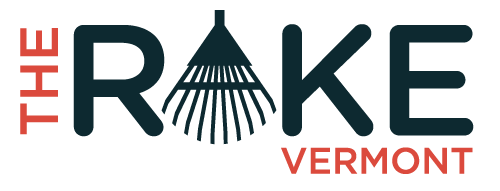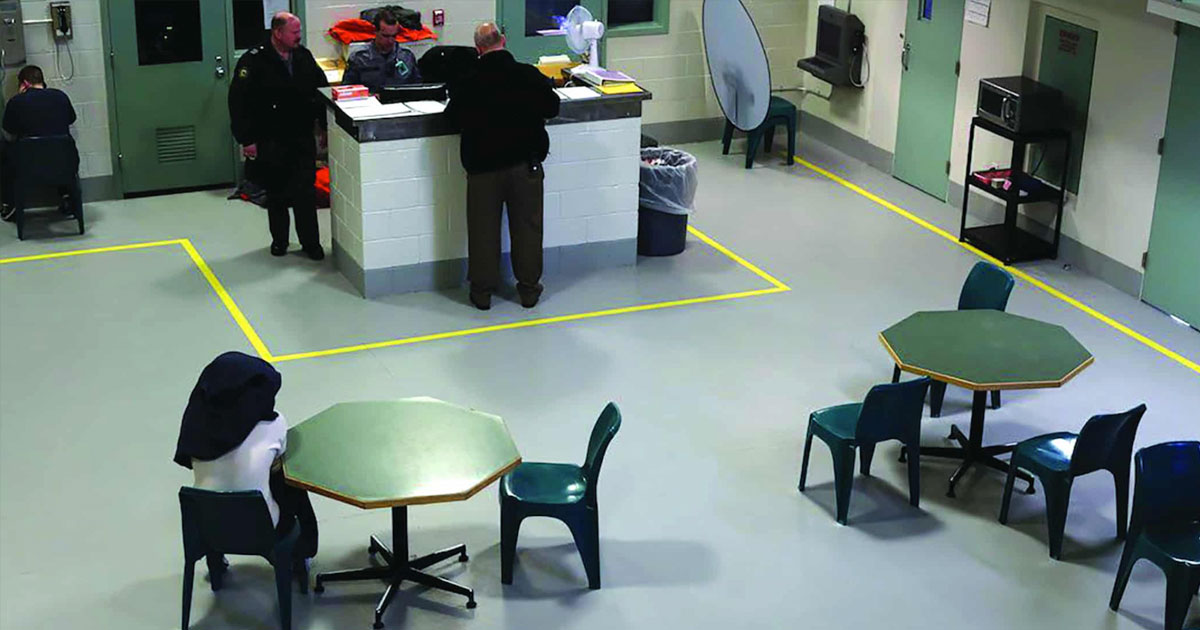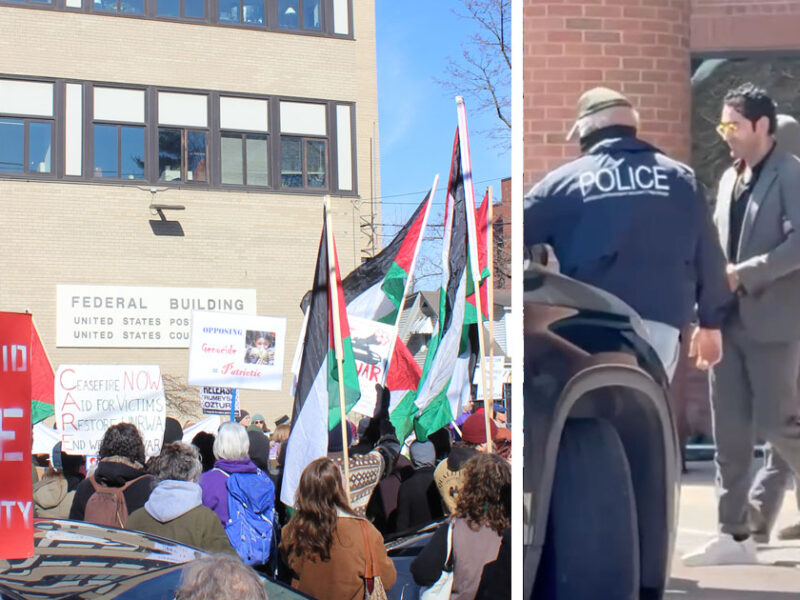From our inception, the Rake Vermont has looked closely at Vermont’s carceral system, the focus of our first two investigative series. We reprint the article below by Jonathan Elwell, an organizer with FreeHer Vermont and VermontJustJustice. He co-wrote this piece with men incarcerated at NSCF in Newport, Vermont, who choose to remain anonymous. The article first appeared at VermontJustJustice.
His words were scratching through the poor connection of our video call and interrupted by banging doors and shouting voices, but his conviction could not have been any clearer: “I would rather have never known about the program than have something to invest my hope and creativity into and give ideas that were never brought anywhere. Our ideas never left that room. That’s not just grant fraud, that is spiritual fraud.”
He was telling me about the Prison Research and Innovation Network, known simply as PRIN, which began in Vermont in the fall of 2020. PRIN is a five-year pilot project that brings together a variety of different institutions; it is funded by Arnold Ventures, whose fortune is linked to corporate payouts in the final days of Enron; overseen by the Urban Institute, a DC-based non-profit; studied by researchers at the University of Vermont; and ultimately controlled by the Vermont Department of Corrections. Vermont DOC’s website describes PRIN as an effort at “improving prison environments and ensuring dignity and humanity for all.”
The VT DOC emphasizes collaboration with another group: the people who are incarcerated at Southern State Correctional Facility (SSCF) in Springfield, where the program is located. On the PRIN page on the DOC’s website, they place in bold that “this project will enlist the input of people confined and working in SSCF in the research study design, review of findings, and development of recommendations for improvements.”
Because PRIN exists only at SSCF, I was quite surprised last month when I was contacted by people incarcerated at Northern State Correctional Facility (NSCF) in Newport who wanted to share their experience with the project. But once we connected, the fact that they were at NSCF was no longer a surprising footnote in a story about a program happening a couple hours to the south. Instead, it quickly became clear that their relocation to Newport was at the heart of it – and that telling the story of when and why they ended up there would illuminate the nature of the entire PRIN project in Vermont.
The Promise of PRIN
In the words of the Urban Institute, the project is “an effort to build evidence and spur innovation to make prisons more humane, safe, and rehabilitative environments.” In the words of Corrections Commissioner Nick Deml, “PRIN continues to be an essential tool in creating transparency in our correctional system and guiding evidence-based improvements” which “is helping Vermont build a safer, healthier, and more humane system for the benefit of all on our team and in our care.”
But this vision of transparency, collaboration, and improvement does not hold up against the experience of the incarcerated individuals who have been involved in the project. From their perspective, PRIN is seen as anything from a significantly missed opportunity to a laughingstock among their fellow SSCF residents and staff members to a classic example of DOC abuse and control disguised as coincidence and well-intentioned bureaucracy. Rather than an inspiring account of positive change, the PRIN project is instead yet another example of DOC’s inability to reform itself – with grave costs to those living under its control.
PRIN is split into two phases. Phase I ran throughout 2020 and 2021. This part of the project was focused on information gathering. The two UVM researchers – Kathy Fox and Abby Crocker – conducted focus groups and interviews with both incarcerated people and prison staff. Through these conversations, they, along with several incarcerated individuals and DOC staff, crafted surveys for both groups which were administered in June 2021.
The results of the survey, released in January 2022, are unsurprising to those with experience in Vermont’s prisons. But they are deeply disturbing, nonetheless.
The staff feedback was grim. Two-thirds said that they would leave for a similar paying job when they have the chance. Only 5% said that staff morale was high. 49% reported developing anxiety, 46% reported developing depression, and 39% reported developing PTSD since beginning work in the prison system. They also sympathized with the conditions that incarcerated people are forced to endure, with only 14% agreeing that the prison programming gave incarcerated people the skills they need to be successful in the community.
Incarcerated feedback was even worse. Since entering prison, incarcerated folks reported developing anxiety, depression, and PTSD at rates of 70%, 65%, and 55%, respectively. The overwhelming majority agreed that they do not get the healthcare they need when they need it, they don’t get the tools they need to successfully re-enter their communities, they don’t feel safe or supported by prison staff, and they cannot get their grievances resolved through DOC’s processes.
These horrific findings were not, however, met with much sympathy from DOC leadership. Here is the entirety of Commissioner Deml’s quote in the DOC’s own press release.
“I am extremely proud of Vermont DOC’s participation in the Prison Research Innovation Network initiative,” said Vermont Department of Corrections Commissioner Nicholas Deml. “Vermont is a national leader in so many public policy areas, and I am committed to ensuring that corrections is at the top of that list. It starts with an across-the-board pledge to transparency as a central tenet in all that we do, and it will be ensured by a commitment to evidence-based approaches to make our facilities more humane, safe, and rehabilitation focused. I deeply appreciate the hard work done by our colleagues at UVM and the Urban Institute and I look forward to our continued collaboration on this important work.”
Incarcerated folks kept coming up with solutions, but GoodHale’s negligence prevented them from implementing them and, instead, only deepened the problems.
Phase II of the project began in January 2022 and is set to continue through the summer of 2024. This portion includes ongoing annual surveys and, crucially, the mandate to begin implementing changes based on the needs and shortcomings identified by the questionnaires and focus groups.
This process of changemaking at SSCF relied on the relationship between Brad GoodHale and the innovation council. GoodHale worked as the Prison Research and Innovation Manager. The position was initially funded for one year by a $100,000 grant from the Urban Institute and has since been incorporated into DOC’s annual budget to the tune of $124,692 in FY 2024. The innovation council is the group of incarcerated people who volunteer their time to be involved in the PRIN process.
In early 2022, GoodHale was actively encouraging new folks to join the innovation council as they began to pivot towards addressing the many problems exposed by the previous year’s surveys. As with most processes within DOC, this moved very slowly. But it was still moving, nonetheless, in what appeared to be a positive direction, as the innovation council members collaborated to make decisions about which goals to pursue. They thoughtfully and collectively generated ideas for creative initiatives around mental health (bringing in more specialized professionals); more supportive re-entry into the community (in-prison presentations by community organizations to facilitate warm handoffs); trainings for incarcerated people to become recovery coaches; or peer support from recently incarcerated community members.
But GoodHale encouraged the men to restrict their imaginations, pushing them to focus on improving storage options. Each incarcerated person was allowed only one bin of items. This small bin limited both the amount of items they could maintain and also restricted the kinds of things they could keep and do. For instance, they might have been able to store dry clothes in their bin, but there is nowhere to hang laundry up to dry in an average cell at SSCF.
Although this did not touch on any of the issues raised in the PRIN surveys and delayed engagement with the projects they preferred, the men went along with GoodHale’s desire to start with this low-hanging fruit – especially because of DOC’s framing that starting here would allow the group to generate momentum toward their bigger goals. Several innovation council members collaborated to produce a comprehensive presentation outlining the limitations of existing storage and many possibilities for improvements, including shelving, hooks, and additional bins to make cells more livable and ease restrictions on personal items like books.
In December of last year, the innovation council members presented their work to the Executive Committee – a group composed of legislators, DOC leaders (including Commissioner Deml), and public advocates that was formed to oversee the implementation of PRIN findings and initiatives. The feedback from legislators and DOC leadership was very positive. Not only was this a compelling presentation of what was currently lacking, it also identified clear, actionable steps which would immediately improve quality of life for people incarcerated in Springfield.
GoodHale responded positively, as well, telling the members of the innovation council that they now needed to finalize an order for new items and he would get the plan approved by higher ups in DOC.
Manipulation and Mistrust
This is where the true nature of the project began to reveal itself.
The new items did not arrive until May of 2023 – six months after the presentation. And after that long wait, they did not receive hooks or shelving, which they were told would be prohibitively expensive. Instead, the entire budget was spent on bins. A firm figure was not provided, but different Springfield employees told the men that the DOC spent between $30,000-40,000 – for only a few hundred bins. And the bins themselves were not even the bins that the innovation council requested – the group had requested two larger bins to replace the single smaller one, but they received only one, different new tote. When the bins finally arrived, they sat in the gym at SSCF for weeks before being distributed.
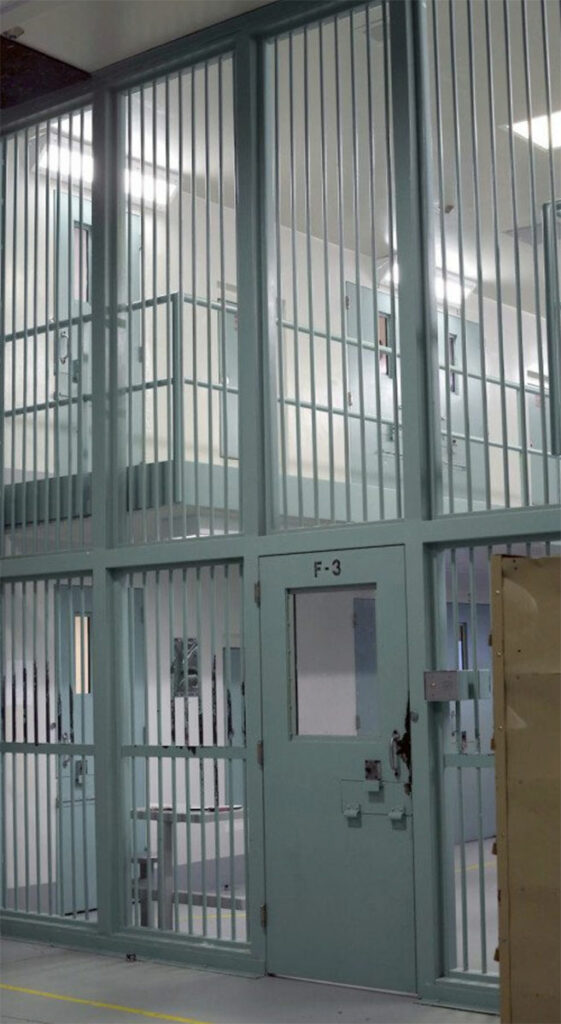
During this period, the relationships at the heart of this work began to fall apart. Or maybe it is more accurate to say that the veil of collaboration began to erode, exposing the entrenched power dynamics at the heart of this work. As GoodHale’s title of Prison Research and Innovation Manager indicates, his role is focused entirely on the PRIN program – which, again, is taking place solely at SSCF. But the innovation council members incarcerated there did not see GoodHale for weeks at a time. When he would return, sometimes he would say that he was busy working at the DOC’s central office in Waterbury. Other times he would brag to innovation council members about vacations he went on, including a trip to the Mediterranean island of Ibiza. This was especially destructive because the innovation council could not meet without GoodHale present. His regular, uncommunicated absences interrupted PRIN activities and stunted any momentum the group was building, despite the persistence of incarcerated people who continued to show up despite GoodHale’s inconsistency.
When they did have meetings, the sessions were disjointed from a lack of group cohesion and limited planning. It felt as if the group had to rehash old conversations every time to bring new members up to speed. Innovation council members came up with a solution that GoodHale approved. They put together a plan to host regular orientation meetings for new members interested in joining the innovation council. This would enable them to integrate new, interested folks into the group without hindering the precious moments when they were able to meet.
One remembers becoming suicidal due to the way that his agency and hope – qualities so rarely nurtured in prison, yet seemingly possible through the early promise of PRIN – had been taken from him as the project fell apart.
Unfortunately, GoodHale failed to show up to these meetings, as well, leading to many last minute cancellations. The broken promises from GoodHale to innovation council members created broken promises between those members and the other incarcerated people they had invited to the orientation meetings. Incarcerated folks kept coming up with solutions, but GoodHale’s negligence prevented them from implementing them and, instead, only deepened the problems.
Along with the long wait for the promised bins, these regular disruptions soured PRIN’s reputation among incarcerated people at SSCF. PRIN was no longer seen as an exciting possibility for change or a unique moment for people in prison to exercise some autonomy over their confined community. Instead, it became a laughingstock. And the folks who had become central to it felt this change most deeply. One remembers becoming suicidal due to the way that his agency and hope – qualities so rarely nurtured in prison, yet seemingly possible through the early promise of PRIN – had been taken from him as the project fell apart. “As a community organizer I was grateful to have an opportunity like PRIN to channel that energy through while incarcerated,” he said. “Unfortunately, while the grant and initial project may have been created in that spirit, Vermont’s execution of it has been nothing more than smoke and mirrors.”
Once the bins finally arrived, GoodHale suggested to innovation council members that this could be a moment to change the narrative around PRIN and restore the project’s declining reputation. He requested that two of the major organizers behind the bin presentation write a memo outlining the process and that innovation council members should distribute the bins. These measures would clearly define PRIN’s role in this positive change and allow members to feel some pride in seeing one of their efforts finally come to fruition. They worked together on the memo and submitted it to GoodHale. None of the incarcerated people I have spoken to reported seeing it distributed. Multiple said GoodHale acknowledged to them he never sent it out.
For some of the folks who had given so much time and energy and care to the PRIN process, this was the final straw. At the next scheduled meeting, several innovation council members raised their concerns and frustrations to the group, including directly to GoodHale. He did not attempt to meaningfully address their concerns.
But a conversation after this meeting with one of the UVM researchers revealed to the men that GoodHale was not being truthful when he told the innovation council members that he had passed along their ideas and was waiting for approval. In fact, this was the first the researchers were hearing of many of their concerns and many of the ideas they had put forth. The approval that incarcerated folks were so eagerly waiting for was never going to come because GoodHale had never requested it.
Disappointed at having been so thoroughly misled, some members of the innovation council spoke more passionately at the next meeting – which, likely in response to the dissent at the previous meeting, was attended by SSCF Superintendent Mike Lyon (who has since retired) and DOC Policy Director Isaac Dayno (who, at the time, was GoodHale’s direct supervisor). The incarcerated individuals complained about the many ways they had been let down and the harmful impact this had on the group’s progress and their own mental and emotional wellbeing. One of the members said that he would report what was happening to the Urban Institute because it constituted grant fraud, a claim reinforced by his career experience as a grant writer. Fox and Crocker, the two UVM researchers, began to ask questions to try to learn more about what the men had experienced.
At this moment, the PRIN process was hanging by a thread. Trust had eroded between innovation council members and DOC staff, but the men were speaking up in the hope that they could still salvage some part of PRIN’s potential. Even though they had been so thoroughly frustrated and misled, they still hoped that some sort of resolution and positive change was possible.
But rather than allow Fox and Crocker to explore what had occurred, Superintendent Lyon shut them down, telling everyone in attendance that the UVM researchers were there only to listen and it was the DOC that remained in full control of the process. One innovation council member described this as Lyon’s effort to make it clear to the men that Fox and Crocker could not save them.
Retaliation and Relocation
From this moment forward, the Vermont DOC has engaged in systematic retaliation against those who spoke out and placed increasing restrictions and surveillance on what remains of the innovation council.
Most of the dissenters were transferred to other prisons in the weeks and months following the meeting. The most vocal member was moved first, just days after the meeting where he said he was going to report GoodHale to the Urban Institute for fraud misuse of funds. Six out of the nine most vocal dissidents have been moved by the time of writing. By shipping them out of Springfield, DOC administrators were removing them from the one prison where they could participate in the PRIN process. Several are now at Northern State Correctional Facility in Newport. Two of the men moved to Newport have deep ties to the Springfield area, going well beyond just PRIN. They are from Windsor County, their cases are in Windsor County court, their ongoing ties to community mental health support are in Windsor County, and yet they were transferred to the Canadian border – making in-person visits inconvenient for some family and friends and nearly impossible for their disabled family members. Not only this, but NSCF has far fewer options for programming and fewer mental health resources than SSCF, depriving the men of important opportunities for connection, treatment, and rehabilitation. This is especially true for the men who are pretrial detainees. They have been held for years awaiting trial, despite not being convicted of any crime. But, still, they are legally denied the right to participate in many programs which are only available to sentenced individuals. Significantly, the former PRIN members were spread among different blocks in Newport. This move limited their ability to speak with one another, restricting possibilities for solidarity and ongoing connection.
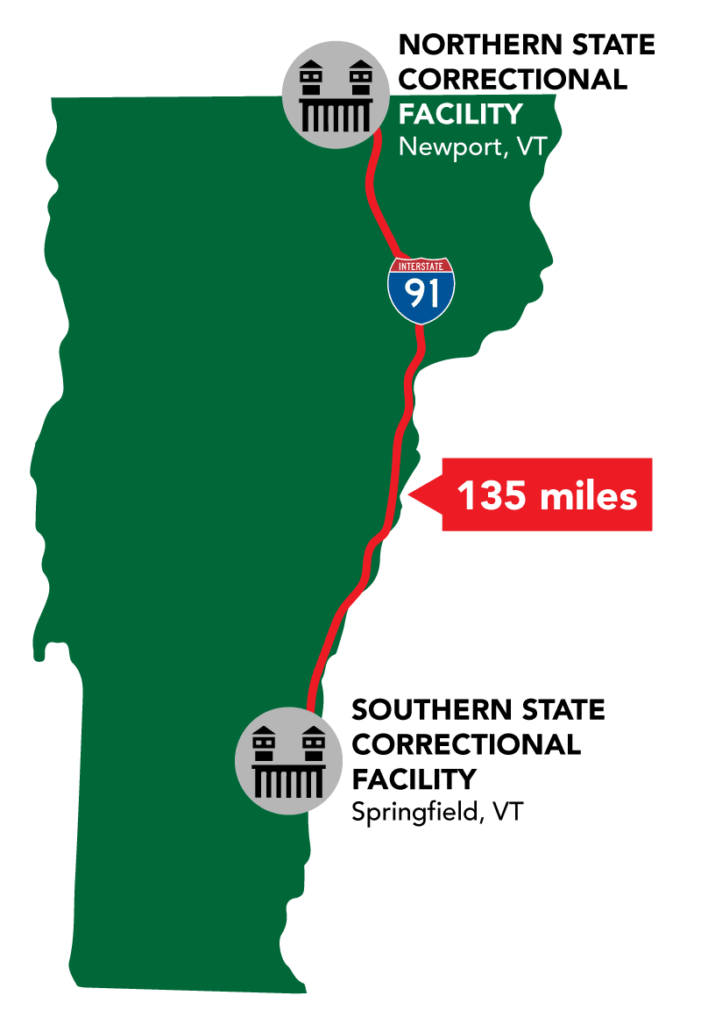
At SSCF, those in power have tightened their grip on the PRIN process. Assistant Superintendent Kevin Jenkins and Security and Operations Supervisor Milton McWayne now regularly attend innovation council meetings. This stifles conversation as incarcerated people are extremely hesitant to voice any kind of concern or grievance in front of the senior, security-focused staff members. Then-Assistant Superintendent Michaela Merrill – who has since been promoted to Interim Superintendent following Lyon’s retirement – has also attended subsequent meetings, including one where she boasted at length about how she comes from a long line of people who have taken pride in putting away bad guys, including a great-great-grandfather who was a ‘hangman’ in Texas. Supervision of GoodHale and the PRIN process shifted from Dayno – who works at the DOC’s Central Office in Waterbury – to the administration at SSCF, further centralizing power among a group of people who show no intention of making positive changes.
Those in charge of PRIN are now reorienting the project to focus on other initiatives. The innovation council is now working towards hosting ice cream socials at SSCF. Most of us could agree that an ice cream social would be a positive event, but it is a scant return on hundreds of thousands in grant funding, fails to address the many material needs exposed by the surveys, and a far cry from the many innovative, data-driven projects proposed by innovation council members.
The research wing of the project is now focusing greater attention on the Honor Unit, a cell block at SSCF where the men have significantly more freedom in their day-to-day lives than is typical in other units. The Honor Unit shows that many of the men who Vermont incarcerates are able to live as positive, collaborative community members when given the opportunity to exercise their own will and it opens up exciting possibilities for greater freedom within prison environments. Crucially, however, all the power remains with DOC, who have rolled back some of the privileges since the unit began operating last summer and use the unit as another tool to incentivize obedience. For example, it was made clear to multiple PRIN members that their status in the Honor Unit could be altered based on whether or not they spoke out against DOC mismanagement. The majority never even made it into the Honor Unit, despite their behavioral records and history of positive leadership through PRIN. One member was told by staff that he had been “blackballed” and labelled as “meddlesome” because he advocated for better treatment and spoke out against racism. Regardless of one’s perspective on the Honor Unit, one thing is certain – it was not an innovation developed through the PRIN process. Instead, it came from SSCF leadership, who had tried a similar idea years ago and returned to it recently in the midst of a prolonged staffing crisis. But now, with the four and a half year PRIN pilot coming to a close next summer, DOC is pivoting to focus on the Honor Unit as they scramble to find something to show for the significant investment of time and money in a process that has yet to yield anything meaningful.
GoodHale took his proposal, said he appreciated it and would look over it and then get back to him. The next day, he was moved to Newport. He has not heard a single word from GoodHale.
Following the meeting where innovation council members aired their grievances in front of Mike Lyon, Isaac Dayno, and the rest of the PRIN members, one of the major speakers approached GoodHale with a proposal for group accountability as a way to reconnect and move forward. The message was clear, not just in the language of accountability, but also in the optimism still held towards the group: no matter how bad things may have gotten, we still want to make them better and we can only do that together. GoodHale took his proposal, said he appreciated it and would look over it and then get back to him. The next day, he was moved to Newport. He has not heard a single word from GoodHale. If transferring these men was really not in response to them speaking out, then surely GoodHale would have sent him a letter or given him a call. If he really wanted to help PRIN live up to its promises, he might have even tried to pull some strings to get this person, who clearly cared so deeply about the project, back to Springfield. But, of course, he did none of this.
This individual had also filed a PREA (Prison Rape Elimination Act) complaint against a former roommate while he was still incarcerated at SSCF. Springfield administrators continue to hold the responsibility to investigate his complaint and support his wellbeing. But he has not heard anything for months. To the incarcerated men at the heart of this story, this is yet another indication that SSCF staff continue to prioritize maintaining their own power over ensuring the wellbeing of those who bear the brunt of it.
Notes from a July 12th meeting indicate how GoodHale and other DOC staff attempted to recuperate the image of the project and suppress any dissent around their ongoing retaliation. At this meeting, the group discussed “fighting perception is reality narrative that may be making its rounds through the units.” Security and Operations Supervisor McWayne – who, again, only started attending PRIN meetings after people spoke out – was crucial to this effort. The notes state that, “after meeting with SOS McWayne, group members were more inclined to understand that there was no connection between PRIN and this last movement of incarcerated individuals from SSCF.” Later in the meeting, the group was offered a chance to vote on whether the former innovation council members who had been transferred should be sent regular updates about PRIN activities. Once again, SOS McWayne made clear where he stood, telling the attendees that such communication would present a security risk as it would constitute inmate-to-inmate communication. This ignores the fact that any communication – as with all PRIN activities – would have happened under the close supervision of DOC employees, making covert, subversive communication between inmates next to impossible. But as one incarcerated individual put it, “there’s no logic to it, it’s just to shut us out.”
The meeting notes record that the “possibility of keeping those members moved by DOC updated of the ICA progress was unanimously rejected by the group.” There are two things to mention about this vote. First, it happened in the presence of SOS McWayne, whose authority over punishment and violence at SSCF and previous comments outlawing any such communication would stand as clear threats to anyone who voted in favor of communication with the transferred members. Second, one innovation council member who was present at the meeting claims that he actually voted in favor of updates to former PRIN members at other prisons. But not only was his vote excluded from the official notes – within a week he was transferred to Newport, as well. In the process of his transfer, SSCF staff searched through his belongings and took the notebook containing his PRIN notes. They did not give him any explanation, nor any opportunity to advocate for the return of his notebook.
The systematic attempts to suppress communication and control information do not end there. After hearing of his imminent transfer, one of the major speakers gave his own PRIN notes to another member who was staying at SSCF, who then passed them along to GoodHale. Despite being transferred to NSCF, he still wanted to contribute to PRIN and hoped that his notes – an invaluable record of the last 18 months of work – would enable the group to have greater continuity and future impact. But when GoodHale was asked by other members to share these notes with the group, he said that he had misplaced them. I have experienced this type of informational control, firsthand, as we have tried to collaborate across prison walls to write this story. I have had communication through the DOC-controlled messaging app denied for being “Investigative.”
And while these moments of explicit censorship are particularly telling, DOC also controls information through neglectful omissions, such as their failure to update the PRIN pages on their website. The pages include only the first of the two prison climate surveys, as well as notes from only the first few Executive Committee meetings in 2020 and 2021.
One former innovation council member, who had been moved to NSCF in the wake of these conflicts, was transferred back to SSCF ahead of an upcoming hearing in Windsor County Court. He was held in booking for over a week – well beyond the maximum time of 72 hours according to DOC’s own policies – without access to his belongings, tablet, communication to family members, and basic hygiene products.
While he was there, GoodHale passed through the booking area and walked up to the window of his cell. GoodHale said, “I heard you weren’t going to be back here.” The man answered that was only there temporarily waiting for his court date. GoodHale replied, “Good,” and walked away.
What the Men Hope for Now
Many of the men who have been misled and abused in this process now feel the need to share their story publicly because to them it has become absolutely clear that this process is not meant to create real change. It is obvious to them that the VT DOC does not intend to realize the early promise of PRIN. Instead, as with so many other efforts and initiatives under their control, it is simply another tool to improve the DOC’s public image and pacify and discipline their incarcerated population. When the men brought these issues up internally, they did not see any positive change nor receive an apology. Instead, they were retaliated against; they and their reality were placed under attack. So now they need to speak out publicly.
…in the words of one former innovation council member, it is time to stop “accepting all of these things as coincidence, instead of recognizing that this is a systemic and institutionalized cover up… It’s just a bad thing to do to a group of people who already feel so hopeless.”
The men want to speak directly with the Urban Institute. As one told me, “If you really want to invest in the people behind these walls, then you need to talk directly with the people behind these walls. Listen to our projects and invest directly in those.” The Urban Institute will be sent this post in full and I am hopeful that we will be able to connect them directly to the men involved.
If you are skeptical about any of this account or perhaps in the future find yourself being convinced by DOC’s inevitably untruthful response – if it they respond at all – please remember that these men are speaking out at tremendous risk to their safety and wellbeing. They have already experienced retaliation for speaking out and they realize that further consequences are likely for sharing this story. They have no incentive for exaggerating the truth. Instead, the opposite is true. And yet, they are still moving forward because, in the words of one former innovation council member, it is time to stop “accepting all of these things as coincidence, instead of recognizing that this is a systemic and institutionalized cover up… It’s just a bad thing to do to a group of people who already feel so hopeless.”
If there is anything redeeming in this story, it is the resilience and perseverance of those incarcerated people at the heart of it. While PRIN may be beyond repair, those people are not. They are no longer hoping to restore PRIN, but they will not stop fighting for the hope, dignity, and possibility that the project once promised and that they have always deserved.
This year has seen many horrific stories from Vermont prisons reach the public – Matthew Morgan being kept in prison for four years on a disproven furlough violation; systemic failures in mental and physical health care; David Mitchell losing his life because of DOC’s abusive, life-taking culture of violence. These stories have been deeply shocking, and yet, also strangely not, as they conform to our stereotypes about prisons and fall in line with historical failures of Vermont DOC. We are conditioned to accept prisons as places of institutionalized violence and deprivation, kept well out of sight and, except for brief news cycles in the wake of particularly spectacular or deadly violence, out of mind.
But this horrific story is slightly different. PRIN did not start with a crisis or catastrophe. Instead, it started with the recognition that things needed to change; it was borne out of an acknowledgement that prisons created deadly environments that did not support rehabilitation. It was a golden opportunity, with hundreds of thousands of dollars in independent funding and peer and expert outside support, to make things even just slightly better. And yet even with this opportunity served up to them on a platter, VT DOC could not take it. They could not run this program supportively, collaboratively, and humanely because that is not in their nature. Instead, they fell back on all they know: coercion, violence, abuse, and control.
Since we originally put together this piece, the men in Newport have heard through the grapevine that GoodHale moved out of Vermont, leaving his role as PRIN, and been replaced by Anthony Giordano, who was previously SSCF’s Volunteer Coordinator. But I hope it is by now extremely clear that, while GoodHale is at the center of much of this story, these problems did not begin with him and they will certainly not end with his departure. This is not about GoodHale – it’s about the systems of violence that enabled and empowered him.
DOC may say that they care about the people in their prisons, but their actions tell a completely different story. But now, the responsibility is no longer just with DOC, but also with us, those in the community who are hearing this message that has finally spread beyond prison walls. DOC clearly does not care to listen, much less to change anything. Will we care to listen? Will we care to fight?
Jonathan Elwell is an educator, organizer, and writer from Brattleboro.
